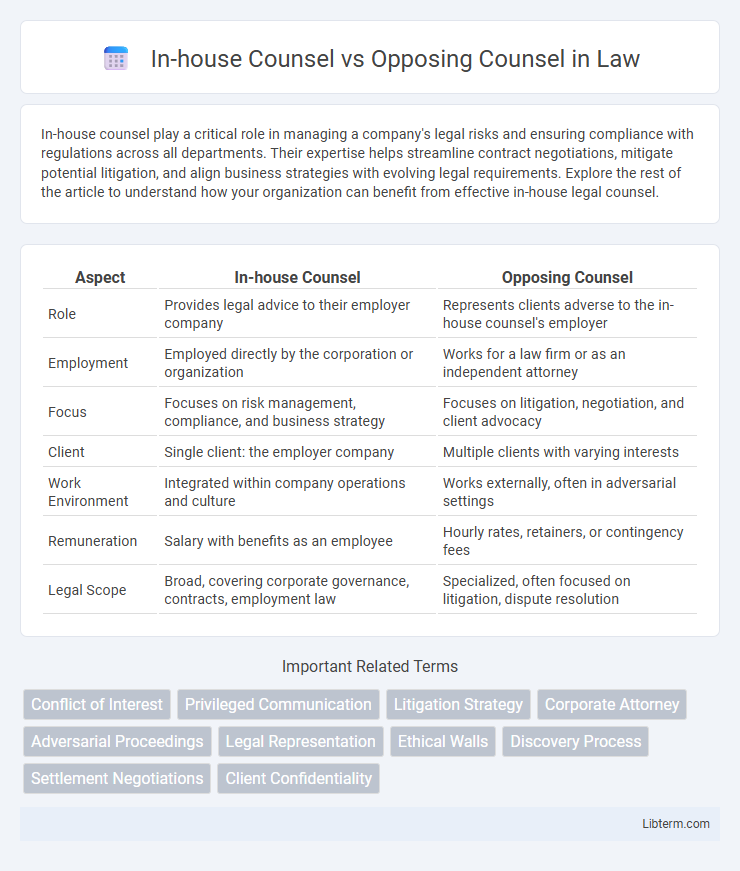In-house counsel play a critical role in managing a company's legal risks and ensuring compliance with regulations across all departments. Their expertise helps streamline contract negotiations, mitigate potential litigation, and align business strategies with evolving legal requirements. Explore the rest of the article to understand how your organization can benefit from effective in-house legal counsel.
Table of Comparison
| Aspect | In-house Counsel | Opposing Counsel |
|---|---|---|
| Role | Provides legal advice to their employer company | Represents clients adverse to the in-house counsel's employer |
| Employment | Employed directly by the corporation or organization | Works for a law firm or as an independent attorney |
| Focus | Focuses on risk management, compliance, and business strategy | Focuses on litigation, negotiation, and client advocacy |
| Client | Single client: the employer company | Multiple clients with varying interests |
| Work Environment | Integrated within company operations and culture | Works externally, often in adversarial settings |
| Remuneration | Salary with benefits as an employee | Hourly rates, retainers, or contingency fees |
| Legal Scope | Broad, covering corporate governance, contracts, employment law | Specialized, often focused on litigation, dispute resolution |
Introduction to In-house Counsel and Opposing Counsel
In-house counsel are legal professionals employed directly by a corporation to manage its legal affairs, ensuring compliance and mitigating risks within the organization. Opposing counsel refers to attorneys representing the adverse party in a legal dispute, focused on protecting their client's interests against the in-house team. Understanding the distinct roles and strategic approaches of in-house counsel versus opposing counsel is crucial for effective legal negotiation and litigation management.
Defining the Roles: In-house vs Opposing Counsel
In-house counsel serves as the legal advisor within an organization, handling a broad range of legal matters, ensuring compliance, and providing strategic guidance aligned with the company's business objectives. Opposing counsel, on the other hand, represents clients in adversarial legal proceedings, advocating for their interests in disputes, litigation, or negotiations against the other party. The primary distinction lies in in-house counsel's proactive, preventive legal management versus opposing counsel's reactive, adversarial role in resolving conflicts.
Key Responsibilities of In-house Counsel
In-house counsel primarily manages a company's legal compliance, providing proactive risk management and overseeing contracts, mergers, and internal investigations to align with corporate goals. They serve as strategic advisors to executive teams, ensuring all business operations comply with applicable laws and regulations while protecting the company's intellectual property and mitigating litigation risks. Unlike opposing counsel, who focus on representing external clients in disputes, in-house counsel are embedded within the organization, driving legal strategy and facilitating seamless communication between legal and business departments.
Core Duties of Opposing Counsel
Opposing counsel's core duties involve zealous representation of their client's interests by evaluating evidence, formulating legal strategies, and advocating aggressively in negotiations or court proceedings. They must identify strengths and weaknesses in the opposing party's case, ensure compliance with procedural rules, and maintain professional ethics while challenging in-house counsel's positions. Effective opposing counsel serve as a critical check, pushing for just outcomes and protecting their client's legal rights throughout the litigation or dispute resolution process.
Strategic Objectives and Priorities
In-house counsel prioritize risk management, regulatory compliance, and aligning legal strategies with business objectives to protect their organization's interests. Opposing counsel focus on aggressively advocating for their clients' positions, leveraging litigation tactics and negotiation skills to achieve favorable outcomes. Understanding these strategic priorities allows for effective communication and more informed dispute resolution processes.
Communication with Clients and Stakeholders
In-house counsel maintain direct and continuous communication with clients and internal stakeholders to ensure legal advice aligns with business objectives and risk tolerance. Opposing counsel typically engage with clients less frequently, focusing primarily on negotiation, litigation, and strategic interactions with in-house counsel rather than direct client communication. Effective communication by in-house counsel facilitates proactive risk management, while opposing counsel emphasize advocacy and dispute resolution through structured, often formal channels.
Legal Strategy and Risk Management
In-house counsel prioritize aligning legal strategies with the company's business objectives, emphasizing proactive risk management to mitigate potential liabilities before they arise. Opposing counsel concentrate on identifying vulnerabilities and leveraging legal tactics to advance their client's position in litigation or negotiation. The contrasting approaches influence decision-making processes, with in-house counsel often seeking cost-effective solutions and opposing counsel adopting aggressive strategies to maximize outcomes.
Collaboration vs Adversarial Approach
In-house counsel often emphasize collaboration to align legal strategies with business objectives, fostering proactive risk management and seamless communication across departments. Opposing counsel typically adopt an adversarial approach aimed at advocating strongly for their client's interests, often resulting in more formal negotiation and litigation tactics. Effective legal outcomes frequently depend on balancing these roles, where in-house counsel's cooperation meets opposing counsel's assertiveness to resolve disputes efficiently.
Common Challenges and Solutions
In-house counsel often face challenges such as balancing corporate priorities with legal risks, maintaining confidentiality, and managing tight budgets, while opposing counsel deals with pressure to aggressively advocate for their client and navigate adversarial dynamics. Both parties encounter difficulties in communication breakdowns and aligning strategies despite differing objectives. Effective solutions include establishing clear communication protocols, leveraging technology for document management, and fostering mutual respect to facilitate negotiation and dispute resolution.
Conclusion: Choosing the Right Legal Partner
Selecting the right legal partner depends on organizational needs, with in-house counsel offering deep company knowledge and cost efficiency, while opposing counsel provides specialized expertise and objectivity. Companies prioritizing long-term legal strategy and alignment often benefit from dedicated in-house teams. Those requiring external perspectives or specific litigation skills usually engage opposing counsel to complement their legal resources.
In-house Counsel Infographic

 libterm.com
libterm.com